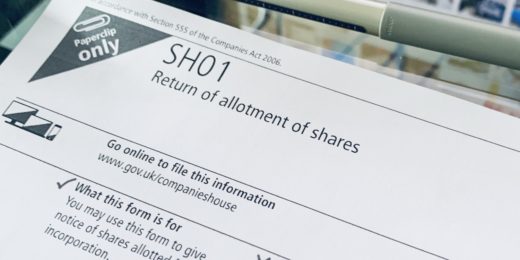You have lots of different options regarding how many shares you can issue when setting up a limited company. A minimum of one share must be issued during the company formation process. If you are registering a company with more than one shareholder (member), you need to issue at least one share per member.
Key Takeaways
- Issuing 100 shares simplifies ownership distribution and enhances future investment opportunities for your business.
- Consider issuing more than one share to facilitate potential sales to outside investors later.
- Understand your financial liability; unpaid shares may require payment if the company faces liquidation.
There is no upper limit to the total quantity of shares you can issue during or after incorporation, unless you include a provision of authorised capital in the articles of association. Prior to the Companies Act 2006, this was a mandatory clause that applied to all companies limited by shares, but it is now optional.
The quantity of shares you issue depends entirely upon the preference of the original members (subscribers) and whether they plan to sell shares to new investors at some point in the future.
Should I issue more than one share per shareholder?
Companies with just one owner will often issue just one share. This means that the shareholder has 100% ownership and control of the business. However, this makes it more complicated to bring in outside investors in the future because you cannot divide one share. You would have to issue new shares if you wanted to sell part of your business to someone else.
A better option is to issue an even quantity like 2, 10, 50, or 100 during the company formation process. This gives you the option of transferring shares (i.e. selling them) to other people in exchange for capital investment, or gifting them to other people such as family members.
Please be aware that members must pay the nominal value of any unpaid shares if the business is wound up, becomes insolvent, or the company requests payment for any other reason. Most companies assign a nominal value of £1 to shares. Therefore, the more shares you issue, the bigger the financial liability of the owners.
How many shares are recommended?
It depends on the circumstances of the business. A good solution that many companies adopt is to issue 100 shares because each unit represents 1% of the firm. This makes it easy to work out the extent of each member’s ownership and control. It also limits their financial liability to a reasonable sum.
Furthermore, a quantity of 100 will allow you to sell smaller portions of the company to more people, rather than selling large chunks of ownership to fewer people. This is a good way to raise additional capital for growing the business, so you should bear this in mind when deciding how many shares to issue.
The historical significance of issuing 100 shares
Prior to the introduction of the Companies Act 2006, limited companies were legally required to include authorised share capital in their articles of association. This determined the Stamp Duty they had to pay to HMRC. 100 was the preferred limit because it was a sufficient and logical quantity, and it also restricted the Stamp Duty payment to an affordable amount. Stamp Duty is now only payable if the sale value of a transfer of shares exceeds £1,000.
When do I need to pay for my shares?
There is no obligation to pay for shares unless the company is wound up or goes into liquidation. However, since most companies issue shares for the purpose of raising capital, it is common to pay for them upon issue.
Payment must be made into the company’s own funds and recorded in the company’s accounts. Payments can be in cash or non-cash.
If the company is wound up, each member is liable to pay the nominal value of their shares. If they have already paid for their shares, no further payments are due.
However, where they are unpaid or partly paid at the time a company is wound up, the outstanding nominal value must be paid at the director’s request.
Please note that the information provided in this article is for general informational purposes only and does not constitute legal, tax, or professional advice. While our aim is that the content is accurate and up to date, it should not be relied upon as a substitute for tailored advice from qualified professionals. We strongly recommend that you seek independent legal and tax advice specific to your circumstances before acting on any information contained in this article. We accept no responsibility or liability for any loss or damage that may result from your reliance on the information provided in this article. Use of the information contained in this article is entirely at your own risk.








Join The Discussion
Comments (26)
Thanks, Rachel for the article. I found this article is quite beginner-friendly 🙂
I am setting up a LTD comanpany on Rapid Formation and I am wondering which price I should give to a share.
I will start fundraising from investors after finishing the company setup.
I would like to issue a large number of share as many as 100,000 so that I can have flexibility in the fundraising.
Thankfully, I found this article that is warning the risk of issuing a large number of shares.
> Please be aware: Members must pay the nominal value of their shares if the business is wound up, becomes insolvent, or is called up by the Directors. £1 is the usual nominal value chosen by most companies. Therefore, the more you issue, the bigger the financial liability of the owners.
It seems safer to me (lesser liability) if I give a very small price (nominal value) to a share and I am thinking to issue 100,000 shares for £0.001 per share.
Am I doing the right thing or are there any pitfalls about this?
Thank you for your kind enquiry, Carole.
There is nothing inherently wrong with issuing £100,000 shares at £0.001p per share. However, investors may be surprised that their nominal share value is lower than 1p (even though it is possible to do this).
You should note that if you are looking for investment via ‘Crowdfunding’, our understanding is that generally crowdfunders do not receive equity (shares) in return for their funding – they simply provide a small amount of funding per person because they like the idea being proposed and want to see it succeed. It is relatively rare for private limited companies to have hundreds or thousands of different shareholders, although this is not impossible or illegal. Each time you sell a share in a private company, you will have to complete a Transfer of Shares process to ensure it is logged correctly with Companies House. You can read more about our Transfer of Shares service here. It may be very time consuming and expensive to carry out tens of thousands of transfer of shares transactions, so we would suggest you research whether your source of investment is disparate and whether it will require shares in your company in return for the investment, prior to issuing the amount of shares you are proposing.
I trust the above information is of use to you.
Kind regards,
Rachel
Hi Rachel,
I have the same question.
We have just formed and will be going for a split between private and seeders investment.
We were going to raise 100,000 shares @ 1p. But when going to seeders at 100,000 @ £1m valuation. (100,000 at £10.
But not sure if this is the correct way of doing this… your help would be much appreciated!
Joe
Thank you for your kind enquiry.
If you believe the value of your business at start-up to be £1million, then forming the company with 100,000 shares valued at £10 each would mean that the nominal value of the shares at start up would be £1million. If I have misunderstood your question, please let me know specifically what information you require.
Kind regards,
Rachel
Shareholders must be open with each other to deal the businesses. This article is very helpful.
I’m glad you found the article useful.
Kind regards,
Rachel
Hi Rachel,
Thank you in advance for finding time to answer some of my questions. But before I ask my questions let me give you a brief background. We intend to open a (Limited Company) business here in the UK, however I am the only British citizen as my brother and my sister are American citizens Now, for my questions:
1. Is there a citizenship requirement for a shareholder?
2. For the three of us, what is the most appropriate in terms of number of shares? Would it help if we include our spouses as shareholders?
3. We also intend to put in £3000 each as a start up capital, should we just deposit it in the bank under the business account of the company?
4. What if we intend to secure a mortgage to purchase a property, what would be the best set up so our company will be approve for a bank loan?
Many thanks
Nick
Hi Nick,
Thanks for getting in touch.
1. There is no citizenship requirement to be a shareholder or director in a UK-registered company, so your brother and sister can purchase shares in the business. I cannot advise on the tax implications of receiving dividends as a non-resident, however – you will have to speak to an accountant about that.
2. The number of shares depends on how much control and profit entitlement you wish to have. If you want equal ownership, you could issue three ordinary shares and each take one. If you wish to own a larger percentage yourself (for example, majority ownership), you should ensure your shareholding percentage is larger than the combined shareholdings of your siblings.
You could do this by issuing 10 or 100 shares and taking 6 or above 50 shares, respectively, for yourself and divide the remaining shares between your siblings. Your control and profit entitlement will be relative to the percentage of your shareholdings.
For tax purposes, you could issue some of the shares to your spouse to take advantage of your individual tax-free Personal Allowances and avoid going into a higher tax-bracket if your income exceeds the basic rate threshold. Again, it may be worthwhile speaking to an accountant to discuss your options.
3. Yes, startup capital should be deposited in the company’s business bank account. This will make it easier to keep track of business finances and complete your accounts and tax returns. You can use a personal current account for business transactions but it’s better to keep things separate.
4. I’m afraid I cannot offer any advice on securing a company mortgage. This is a matter that you should discuss with an accountant.
I hope this helps. All the best.
Rachel Craig
Hi,
I have registered as a limited company with 100 shares, then allotted a further 33 shares at a higher value (fully paid up). I am issuing my investors with a share certificate, but wondering – should I have issued myself with a share certificate when I formed the company? I am out of the 2 month window since incorporation.
Katie
Hi Katie,
Don’t worry – there’s no need for you to issue a share certificate to yourself. Your shareholdings are recorded on the memorandum of association because you became a member during the company formation process. This is essentially your certificate.
Remember to also keep your company’s statutory register of members and RSC register up to date, too. You can find out about these requirements here: https://www.rapidformations.co.uk/blog/what-company-records-and-registers-do-i-have-to-keep/
Best wishes,
Rachel
Hello Rachel,
Many Thanks for your article. I am in the process of registering my private and limited company. I will be the sole Director. Can I just issue 1 share to myself at £1? And add more shares in the future in case other people join?
Thank you very much
Penelope
Hi Penelope,
That’s right – if you are the sole shareholder, you can issue just one share to yourself with a nominal value of £1. The nominal value is the limit of your financial liability for business debts.
If you need to issue more shares at any point in the future, you will be required to complete a return of allotment of shares (Companies House form SH01): https://www.rapidformations.co.uk/blog/the-return-of-allotment-of-shares-explained/
I hope this helps!
All the best,
Rachel
Hello Rachel, thanks for your work here. Please, can one single person form a company as a single director? If yes, how will the shares be allocated?
Hello Ewhubare,
Thank you for your message – I’m really pleased to hear that you find the information helpful.
You can form a limited company with just one person, yes. This means you will be the sole director and shareholder, so you will own the entire company and be responsible for managing it in accordance with UK company law.
When you are completing the company registration application, you can issue just one share and allocate it to yourself – this single share will represent 100% ownership of the company. If you want to offer shares in your company to other investors/family members/business associates in the future, you can issue more than one share during the registration process and own them yourself until you are ready to offer them to other people. This is optional, not necessary – you can always create more shares after your company has been set up if the need arises.
For example:
– If you issue 2 shares, each one will represent 50% of the company.
– If you issued 5 shares, each one will represent 20% of the company.
– If you issued 100 shares, each one will represent 1% of the company.
Each share must be allotted a nominal value, which is usually £1. This nominal value determines shareholder liability for company debts – the more shares you issue, the more liability you have personally if your company is unable to pay its own bills. For this reason, it’s best not to issue more shares than you need.
Does this make sense?
I hope this helps. Please do get back in touch if you have any more questions or need help/advice when setting up your company.
Best wishes,
Rachel Craig
Hi Kelly,
Thanks for your message.
You can change your company’s issued share capital whenever you like, as long as the changes are approved by at least 75% of the existing shareholders who own the shares. You must also check the articles of association to make sure there are no restrictions preventing you from reducing or increasing the share capital.
If you later decide to issue more shares, that is fine. Again, as long as at least 75% of the existing shareholders agree, and there are no restrictions in the articles.
I hope this helps, but please get back to me if you have any more questions.
All the best,
Rachel
Hi. We are in the process of opening our new company and of course struggled with sharehold section. Would you recommend getting 100 shares between two directors? Is that make any sense ? Also when do we pay for them ?
Hi Ela,
100 shares is a popular choice because it’s easy to determine the percentage of ownership represented by each share. It also means you can sell smaller portions of the company in the future if you want to bring in new investors, though you may never need or want to do this. On the other hand, you could also just issue two shares and take one each. More shares can be issued in the future if need be.
Just remember that your issued share capital represents your personal liability for business debts. If you issue 100 shares with a nominal value of £1 each (that’s the standard nominal value most people use) you would both be liable for £50. I’m just mentioning this in case you’re ever tempted to issue a really high number of shares!
It’s up to you and your business partner when you want to pay for your shares. In small companies like yours, most shareholders don’t pay for them unless the business gets into debt. At that point, shareholders are legally required to contribute the nominal value of each share toward the debt. If you want to leave them unpaid for now, that’s fine.
Let me know if you need help with anything else.
Rachel
Thanks Rachel for the article and the elaborate reply! What happens though when the debt is bigger than the total nominal value of all shares? In other words, what’s the worst that can happen when brought to courts in such cases? Can they take assets?
Hi Mike,
You’re welcome!
If the debt is bigger than nominal value of the shares, your creditors can take any remaining assets that belong to the company (but not shareholders’ personal assets like homes, cars, etc). In these types of situations, an insolvency practitioner would be appointed to oversee the dissolution of the insolvent company to liquidate its assets and pay the creditors. In some situations, directors can be held personally liable if they are guilty of wrongful trading.
Here are a couple of sources you may find useful:
http://www.companyrescue.co.uk/company-rescue/guides/insolvency-test
(http://www.icaew.com/en/archive/library/subject-gateways/law/insolvency/legal-alert/when-directors-can-be-personally-liable-on-company-insolvency)
Rachel
Do ALL shares need to be allocated? i.e. can unallocated ones be set aside for later sale to future potential investors?
Dear Tom
Thank you for your message.
You cannot set aside shares as unallocated for a company, however, you can issue new ones whenever you want to as there is no limit to the number which can be issued or the number of new allocations made. You can make any changes by filing an SH01 with Companies House to increase the share capital.
Kind regards
Difference between a company with shares and a company without shares?
Dear Karan
Thank you for your message
There is not so much a difference between companies with and without shares. It is more that there are different types of company which have / do not have shares. The only companies which do not have shares are Limited by Guarantee companies and these are not-for-profit companies so any profits made would be re-invested and would not be taken out by the company officers. Most companies formed in the UK are companies which have shareholders. They own the company so it is important to set the company up with the correct officers as directors and shareholders.
Kind Regards
is there any time limit for issuing shares by a private company after its incorporation?
Hello Jainam
Thank you for your message.
In terms of issuing shares, all new companies must issue at least one when setting up a company. Shares are the measure of ownership of the company and each company must have at least one owner (known as shareholder), from the beginning of its existence.
In terms of the time limit for issuing shares, you can issue more at any date after the company has been formed. This can be done by filing an Annual Return and supplying the new shareholder details to Companies House or you can file an SH01 form with Companies House which only details the increase in shares but not the new shareholders details. These details would then be given when the next Annual Return is filed.
Kind Regards
Under what section should a private company issue atleast one share at the time of incorporation?